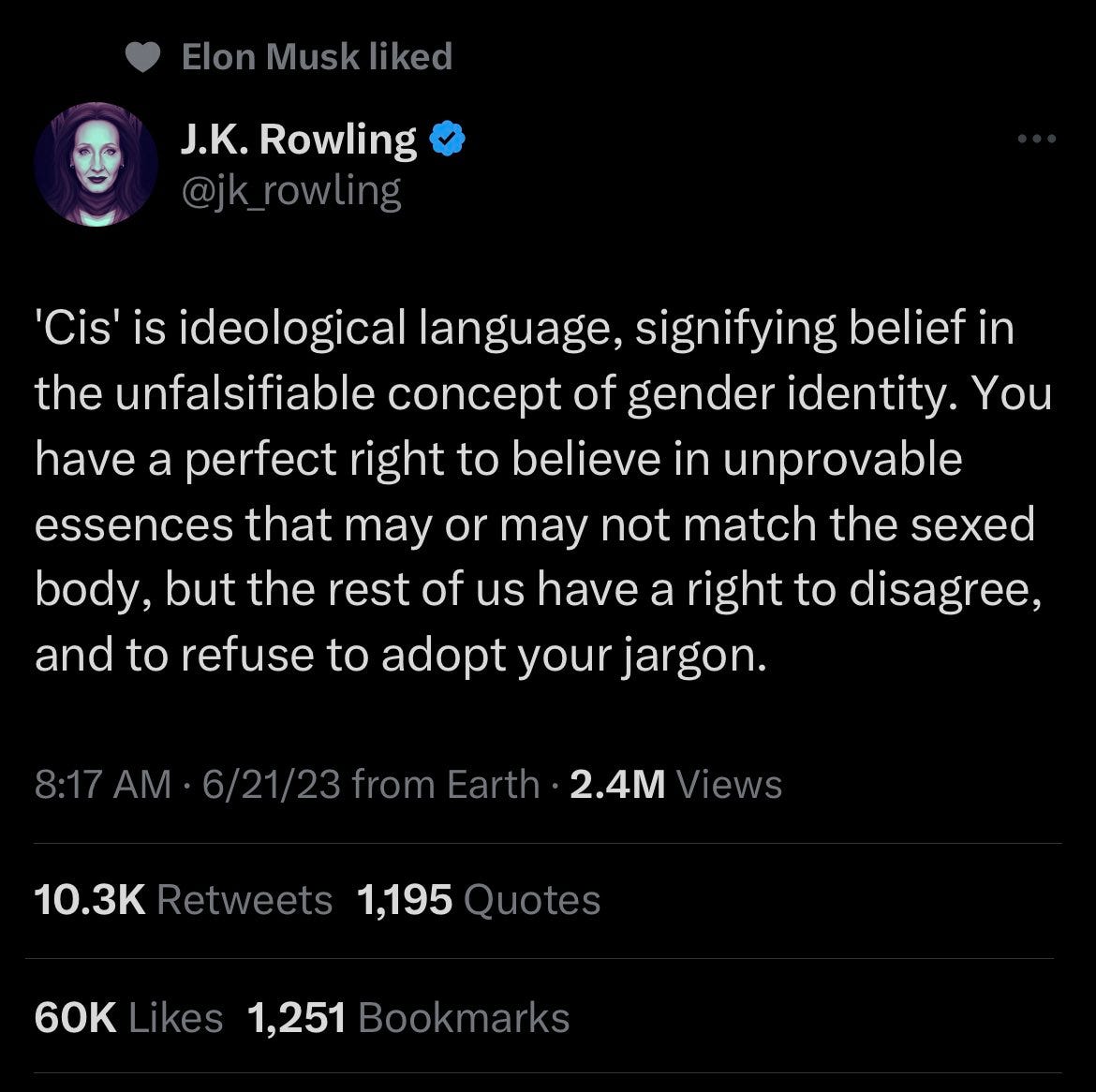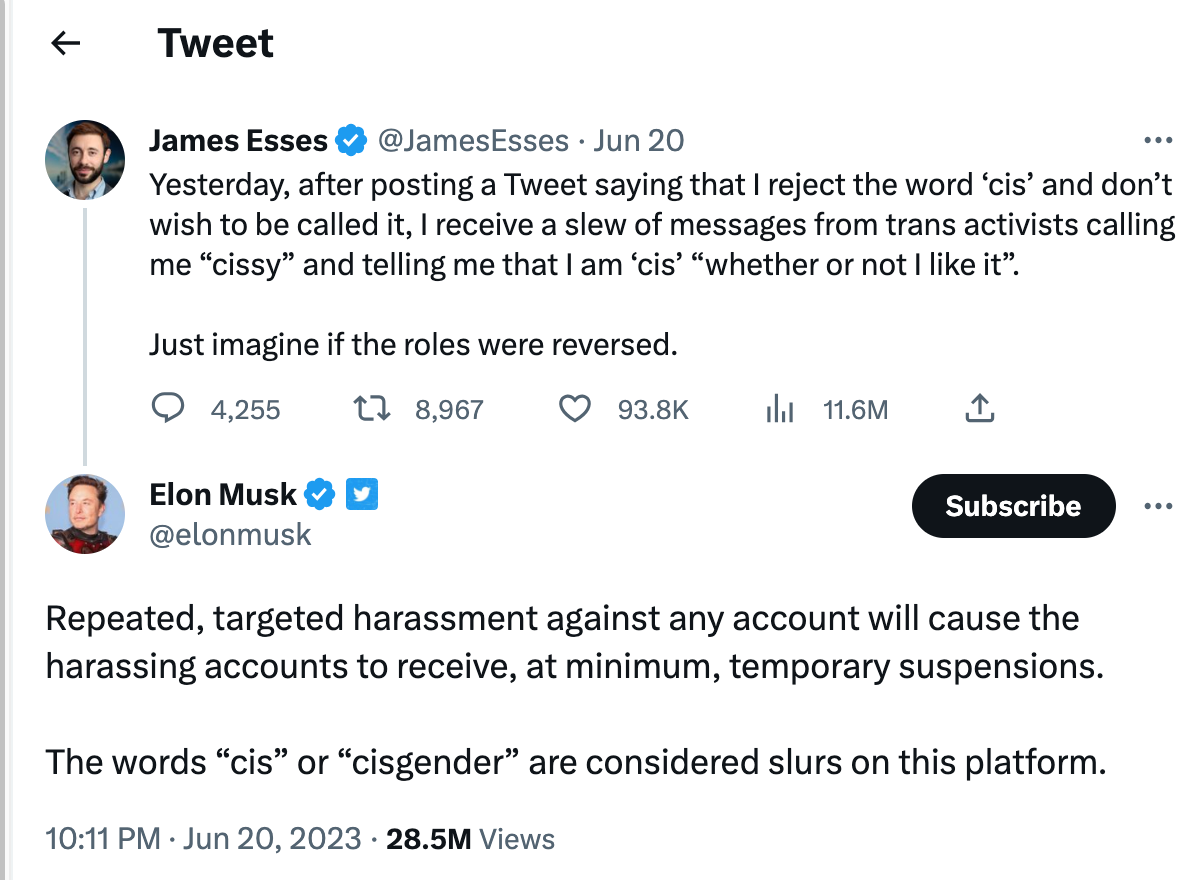Language is a strange thing, if you think about it. We take meaningless gibberish (random sounds) and string that gibberish together into words and then sentences. However, no evolutionary change has done more to elevate humanity than the ability to communicate ideas from person to person to the tiniest detail. How does language do this? Well, it does this by agreement. We take gibberish and agree that it means something, and we pass those agreements from generation to generation. And that’s all language really is, a bunch of standing agreements connecting sounds to ideas. But language is tricky. You have to be well versed in the agreements, or you’re liable to end up with misunderstandings.
Notice that Wesley Morris thinks “kink” is missing from The Little Mermaid.
The ensuing Twitter storm was grand entertainment with no few suggestions that the NYT’s writers are degenerates. However, I think it more likely that film critic Wesley Morris is not particularly well read beyond, well, Twitter, and he used a word that he thought he knew the meaning of. He thought he knew the agreement behind the world “kink.”
Turns out he didn’t, or he chose to ignore it . . . or he is a degenerate who thinks kids’ movies need spice. It is the New York Times after all.
Language is powerful for what it allows us to describe about reality, but it is more powerful for the ways it allows us to “tweak” reality and mislead people, or get them to make agreements they only realize they made after the fact.
And that brings us to the subject before us . . .
Seems like a perfectly innocent term, right?
The whole point of the transgender movement is to convince the rest of us that we should adopt a particular theory as an unquestioned and unquestionable fact. The theory? Transgender people are transgender from birth (rather than say being the product of a mental illness, a child’s natural discomfort as they grow into their bodies, a social contagion, or, as seems to be increasingly the case, a bunch of lazy doctors and psychiatrists who don’t want to take the time to figure out what is really going on), and that gender is mostly (or wholly) unconnected to sex (biology). In other words, being born with particular genitalia has as little to do with being a man or woman as hair color or whether you can roll your tongue. It’s a cosmetic, superficial detail. Of course, if these cosmetic details are so incidental to gender, there would be no need to “affirm” gender with hormones or surgeries. But . . .
The whole things stands up to just cursory scrutiny about as well as wet tissue paper stands up to a hurricane, and that is why the trans movement needs to find other ways to legitimize gender ideology, and this is where language comes in. Language is software for the brain.
An agreement has stood literally since the beginning of English up until about ten seconds ago that the random sounds that make up “woman” (and its predecessor word wifman, Old English for “wife-person”) stand in for an adult human female. The agreement was that “man” and “woman” stood for gendered ideas that were intricately tied to biological sex. If you did have an adult human male dressing up as a woman or even taking on typical women’s roles or women’s mannerisms, that did not make him a woman. He remained a man (albeit perhaps a diminished one and if someone called him a “woman,” it was as an insult, not a purported statement of fact).
But suddenly, somewhere in the last ten years, or even the last five, large groups want to rewrite that agreement. They want us to agree that “woman,” rather than describing the biological reality of having XX chromosomes and all the physical and social trappings that go along with that, instead stands in for just the characteristics themselves, typically the most superficial (and insulting) ones, and “woman” can and should include those that previously went under the set of random sounds that made up “man,” those that had XY chromosomes and all the physical and social trappings that went along with that.
The way they fortify this idea is to steamroll people into habituating themselves to the idea (the agreement) that “woman” naturally includes both a “trans” variety and a “cis” variety, “scientific opposites” as the tweet-head posted above.
To understand the ridiculousness of this, let’s take the idea of “coffee.”1 When you walk into a restaurant and you order “coffee,” how often does the server ask you if you want “decaf” or “regular” (“cis”)? They don’t, at least not me. If I want “decaf” coffee I have to specifically order “decaf” coffee. (And usually they have to brew a new pot because “decaf” coffee just isn’t the done thing because it rather defeats the point of drinking the bitter brew in the first place.)
“Decaf” coffee may be a version of “coffee.” It might be accepted in most cases as “coffee.” But it is not quite “coffee.” There is no “cis” coffee. The word “coffee” is inclusive of the idea of “caffeine,” which is what “decaf” coffee lacks. “Decaf” is an anomaly. When you say, “I want coffee,” the idea that you want caffeine goes without saying. Decaf might taste like “coffee.” It might look like “coffee.” It might smell like “coffee.” It might even be sitting right next to “coffee” in the store in the “coffee” section. But when you’re headed out of town in the wee hours of the morning and you need to stay awake, well, trust me, “decaf” is not coffee.
In normalizing the “cis” qualification before “women,” the trans movement has forced an agreement that 99.9% of what we would have previously understood as “women,” no qualification needed, are really just a subspecies of the same, with no greater claim to—and this is the important part—“women’s” spaces (athletics, locker rooms, prisons, shelters, etc.) than the other variety of “women,” trans women. In other words, the linguistic assumption is that there is no meaningful difference between “trans” women and “cis” women. They’re two sides of the same coin.
So how do we deal with this?
Well, we have three choices:
Go along to get along.
Just refuse to go along.
Fight back.
And number 3 is what James Esses did.2
And it was on.
But my favorite?
Finally, Elon Musk stepped in.
You would have thought someone declared a genocide . . .
A lot of the usual suspects got in on the act. Here’s just one example:
Erasing “trans identities.” Now that’s rich.
Cis coffee exists; decaf coffee exists. Decaf rights are coffee rights.
Of course, some random Twitter user reminded Ms. Bush of the “rules”:
That’s the crux, isn’t it? The rule is . . . no argument from the other side, no matter how rational and sane, can trump “feelings.”
Mr. Esses finally figured out how to use that rule to his advantage.
So may we all.
This article got a little long already, but in case you’re curious where the word “cisgender” comes from, an article in the Los Angelos Daily News from 2017 has the answer:
Here’s, apparently, how it happened. Sexologist Volkmar Sigusch coined the term cissexual (zissexuell in German) in a 1991 paper on transsexuality, and then in subsequent research. Cis is a Latin term meaning “on the side of,” whereas trans means “on the other side.”3
So it makes clinical sense. But that doesn’t mean we have to use it in real life. Those who have adopted the term make the most grasping, absurd claims for it. “It’s been peer-reviewed,” for instance, because it’s been in medical mags. “It’s been in the Oxford English Dictionary since 2013.” So are a lot of words one wouldn’t care to be called. “It’s been a gender choice on Facebook since 2014.” Ah, the final arbiter of sound judgment.
And to add one more nail to the coffin of “cis” I introduce the well-worn modern American “woke” standard of judging by origin. To whit, in a world where American democracy is white supremacy because some of the founders owned slaves, the origin of the prefix “cis” to describe a woman who also “happens” to be female (such a rarity, really, don’t you think?) is important. So, to that end, who exactly is Volkmar Sigusch?
Here’s a quote from Spiegel International in an interview with Sigusch:
SPIEGEL: How exactly do you define good sex?
Sigusch: That's where I agree with Woody Allen: Good sex can be anything, including dirty.
Yes, that Woody Allen.
And his mentioning of Woody Allen is perhaps not so coincidental.
SPIEGEL: What do you see as the biggest taboo in sexuality today?
Sigusch: Clearly child sexuality, including everything that goes with it -- pedophilia, pedosexuality.
SPIEGEL: Can these forms of sexuality be treated with therapy?
Sigusch: It's very important to approach pedophiles and pedosexuals and offer them therapy. It's been my experience that you can reach your objective with what I would call kind-hearted, informed and enlightened patients -- in the sense that they don't lose their desire, but that they no longer have physical contact with children. That would be the goal.
SPIEGEL: It sounds like you believe there’s a group of perpetrators or pedophiles that aren’t reachable through therapy.
Sigusch: Yes, there is. That's been my experience. They can't be reached with offers of therapy. There are pedosexuals who, even if the court forces them to go into treatment, do not pursue it or cannot pursue it. There have also been cases in which I was completely deceived as a therapist and in which the police would suddenly discover recent photographs of children while conducting a search.
SPIEGEL: How should society treat these people?
Sigusch: In accordance with the law. There is no other way to answer the question. We are all potential murderers, and we are all potential rapists and abusers.
Now isn’t that last answer interesting? “In accordance with the law” is not what one would call a rousing denunciation.
And there’s a reason for this. Sigusch himself was part of the German sexologist movement of the 1960s and 1970s. A Substack article by Genevieve Gluck is enlightening in the whole (and free to read), but here’s just a taste:
One key figure behind an open cultural acceptance of pedophilia in Germany was Volkmar Sigusch’s contemporary, the Berlin-based sexologist Helmut Kentler. Kentler placed foster children in the homes of pedophiles beginning in 1969 for the purpose of facilitating child sexual abuse, a project later known as the “Kentler Experiment” or the “Kentler Project”.
This experiment was authorized and subsidized by the Berlin Senate. In 1988, nearly two decades later, Kentler described the project as a “complete success” in a report he submitted to the Senate.
Dr. Joachim Häberlen of the University of Warwick, in his article, “Feeling Like a Child: Dreams and Practices of Sexuality in the West German Alternative Left during the Long 1970s”, says:
“In 1970 members of the German parliament charged with reforming criminal law even listened to radical education scholar Helmut Kentler, sexologist Volkmar Sigusch, and other sociologists and psychologists, who declared that children would not suffer from sexual relations with adults and that those relations should not be punished, because they are a ‘crime without a victim.’”
In 1972, Dutch pro-pedophile activist Dr. Frits Bernard published a paper titled, “Pedophilia - a Disease?” which concluded that “Pedophilic contacts do not damage the psychic development of a child.” According to Dr. Sonja Levsen, in her essay, “Pedophile Apologism in the 1970’s”, Volkmar Sigusch was one of the “advisory scientists” on Bernard’s research.
That is the person and the people who originated the term “cis.”
Is this really a person whose legacy we want to perpetuate and whose term we want to apply to 99 percent of the population?
I’ll let you answer that the next time you hear someone called a “cis” woman or a “cis” man.
Thanks for reading. I hope you all had a great weekend. I did not in fact end up getting eaten by mosquitoes. Instead, I did battle with some of those old-style rosebushes. You know the kind? The homestead’s been gone for a hundred years, but the rose still blooms and covers everything. My left arm from the wrist to the elbow looks like I went to war with a dozen kittens. Apparently wearing leather gloves doesn’t do much good if you’re also in a short-sleeved shirt. But I won and the bushes are no longer hungrily eyeing the house. Point for me.
Actually, a better comparison would be Postum. Do you remember Postum? My father had ulcers and he was relegated to Postum rather than coffee. Finally, he gave up and he started, at seventy-some years of age, drinking tea. But I’d have to explain Postum, so “decaf” coffee works well enough for our purposes here.
Don’t ask me who Mr. Esses is. I don’t know, other than he lit a Twitter firestorm and got Elon Musk’s attention, bless the man.
Actually, “trans” means crosses, such as the “trans-Atlantic slave trade” or “transporting,” which means carrying across, but we won’t quibble. Or maybe we will at some point.


















Lillia, you are just a brilliant writer full of well researched information and a little bit of whit. Your braveness to inform with logic is a rarity. I feel bolstered in my own arguments after reading your essays. Ive always felt the term “cisgender” was a creepy phrase. Now I know why. Thank you for your probing and sharing the truth.
This is your main thrust, I think, that words have meanings, but labeling someone _cisgender_ is as dumb as saying "I'd like a Non- Diet Coke."
I don't understand all this going around your butt to get to your elbow crap. Just call it Coke.
--
Treading lightly... if you decide that someone calling you the N-word is a slur (despite the fact that others _like you_ can address you thusly without the least bit of offense...) then it's a slur. This is part of The Agreement.
I've not been so addressed or labelled as Cis but expect to register my offense immediately and issue a warning that a second offense automatically receive a harsh rebuke.
I might even be offended.